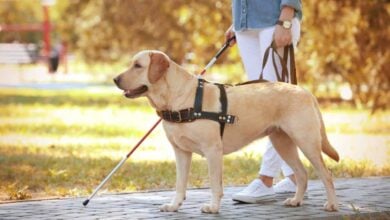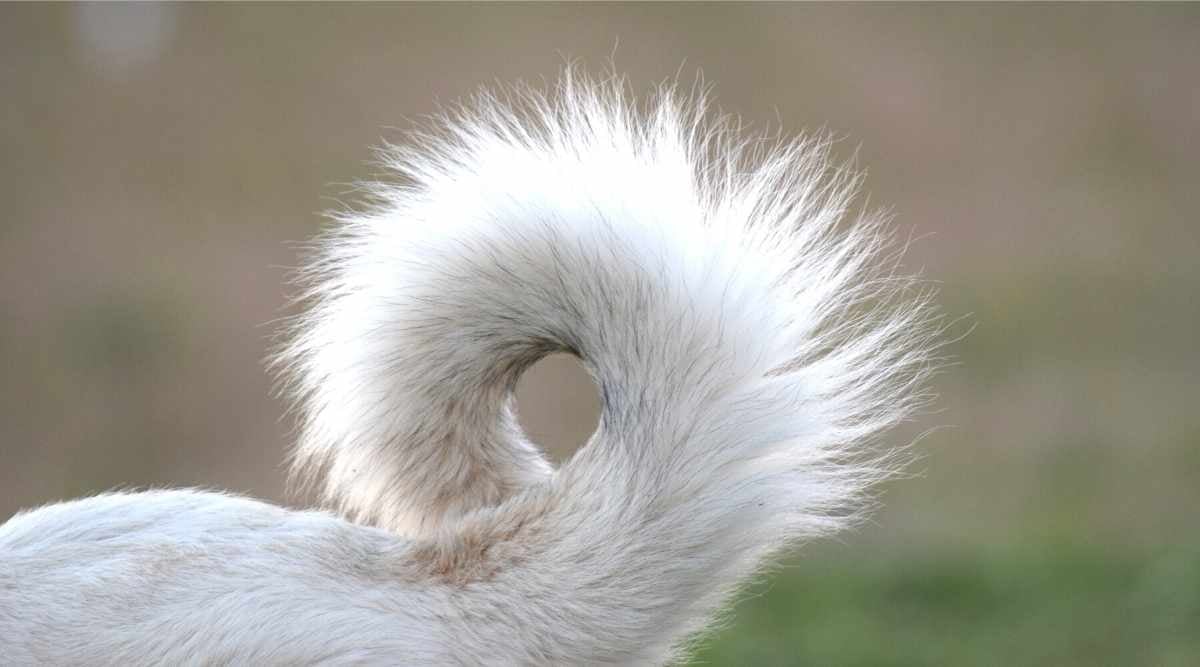Chinook Breed Information: Personality Traits, Temperament, And More
When you purchase through links on our site, we may earn a commission. Here’s how it works.
The Chinook is New Hampshire’s state dog and their answer to the Siberian Husky. They are impressive sled dogs capable of pulling heavy loads over vast areas with great speed. Chinooks are affectionate, gentle giants with sweet personalities who love children. They are also adaptable and mellow as long as their needs are met, which makes them an excellent pairing for active families.
However, because Chinooks are hardworking hounds with a need for speed and a want for pulling heavy weight, they need a very active lifestyle to meet their needs. Plus, they are pack animals and hate being alone for even a little time. Meaning someone needs to be with them for most of the day. So, not every family is a good fit.
Here in this Chinook breed guide, we explore their needs and what they expect from their family. Once you’re sure the Chinook is the canine for you, you need to research reputable breeders and get yourself onto a list. They are an extremely rare breed, and it can take up to two years to take a puppy home. So, let’s start.
Table of Contents
History
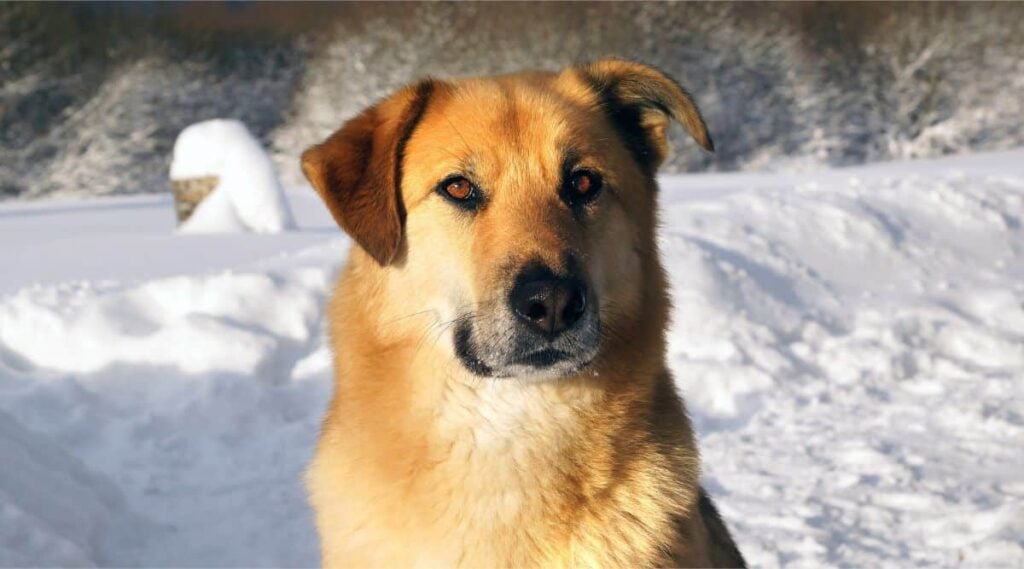
They are a relatively new dog breed compared to other canines, but their history has been a bit of a whirlwind. They were created by adventurer Arthur Treadwell Walden from Wonalancet, New Hampshire, in the late 19th century. Walden was an avid dog lover and breeder and was determined to create his own line of sled dogs.
Walden bred a Mastiff-type dog with Huskies, creating a large and powerful breed with a friendly and affectionate nature. He named the breed after one of his lead dogs on his sled team, Chinook. Chinook is a Native American word that translates to “warm wind.” Although they were very popular dogs then, the famous “Serum Run” of 1925 saw the Siberian Husky rise to fame, putting the Chinook breed in the back seat.
Walden tragically died in 1947, which saw the dramatic decline of the Chinook breed. In 1965, Guinness World Records listed them as the rarest dog breed in the world, with only 125 known specimens. Local Chinook enthusiasts worked hard to save the nearly extinct breed. In 2013 the American Kennel Club (AKC) fully recognized them as a Working dog breed.
Temperament
Chinooks are sweet and sensitive dogs. Despite their large frame and stern demeanor, they still love cuddles. They like to feel they are an integral part of the family pack and want to be involved with everything. Plus, they have a special devotion toward children, making them a great family companion.
Some Chinooks are shy with strangers or those outside their family unit. However, they make terrible guard dogs because they have a mellow and friendly nature and generally do not bark. Thankfully, their size alone is often enough to deter intruders.
Chinooks are pack dogs and enjoy the company of pups, making them a great addition to multi-dog families. They also hate to be on their own for too long and become unhappy and destructive after a few hours. And because you can’t just pop them in your purse, unlike a Chihuahua, your lifestyle must accommodate their needs.
The Chinook has Husky blood coursing through their veins, which means they love to chatter. They aren’t big barkers, but they woo and whine a lot, letting you know how their day went. They also howl and mimic sirens as best they can. This cute trait provides lots of entertainment, especially for kids. But, if you’re seeking a quiet dog, this is not the breed for you.
Size & Appearance
Chinooks are large dogs who weigh between 50 to 90 pounds and measure between 22 and 26 inches tall. Females are typically smaller than males, with softer and more feminine features. They are substantial dual-purpose haulers with the powerful look of freighting dogs and the athletic appearance of sled racers. Despite their size, Chinooks have a soft and cuddly appearance which is why children like them.
Chinooks have a variety of ear shapes, such as drop, prick, or propeller, and some dogs have mismatched ear shapes. Most Chinooks have brown eyes. If you want to show your dog in the ring, their appearance must meet the guidelines in the Chinook breed standard.
Coat & Colors
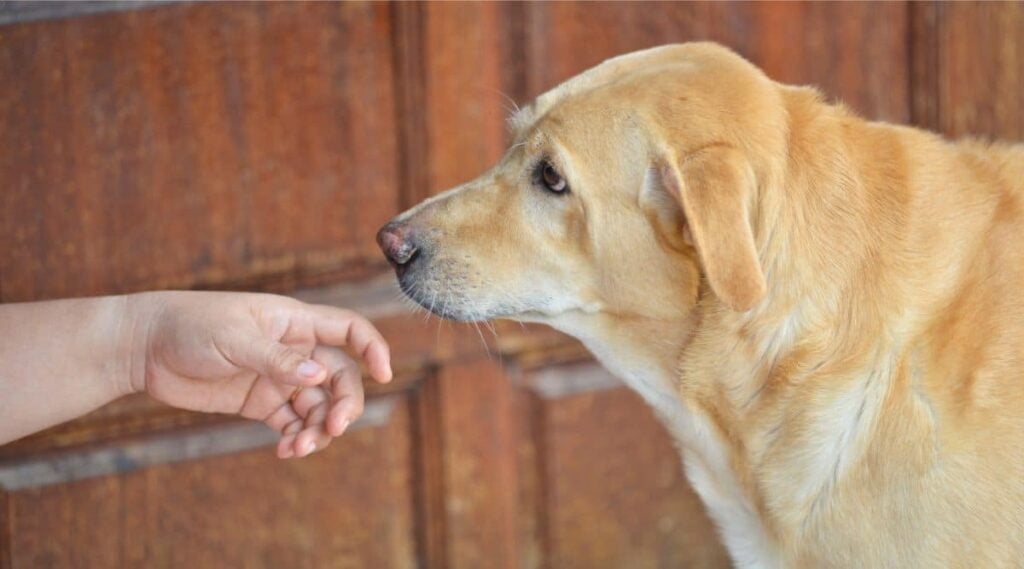
The Chinook has a thick double coat. Their coat is longer in specific areas including around the ruff, shoulder blades, and the underside of the tail. The Chinook’s coat is a shade of tawny, ranging from honey to a deep reddish-gold. Most Chinooks have darker-colored ears and muzzles compared to their body and a black mark above the inner corner of their eyes.
Exercise & Living Conditions
Chinooks are hardworking dogs with lots of energy that needs burning. Otherwise, they become destructive and unhappy. Because Chinooks are mellow around the home, owners mistake this for being lazy, but they are anything but. They thrive on exercise and need at least one hour of intense daily activity. They also need regular playtime throughout the day to keep their mind stimulated.
Chinooks are great companions for long walks, camping trips, hikes, and bicycle rides. They naturally excel at dog sports such as sledding, scootering, skijoring, and bikejoring. And they also enjoy swimming, boating, agility, rallying, and tracking events. Ultimately, they need an active family who can take them wherever they go. If you’re looking for a playful canine companion, you can’t do much better than a Chinook.
Ideally, a Chinook needs a larger home with access to a private yard. However, they can live in an apartment if they get all the necessary exercise. Chinooks are natural diggers, so you need to make your perimeter dig-proof. Many Chinook owners provide their pups with an area they can dig to their heart’s content, such as a sandpit.
Training
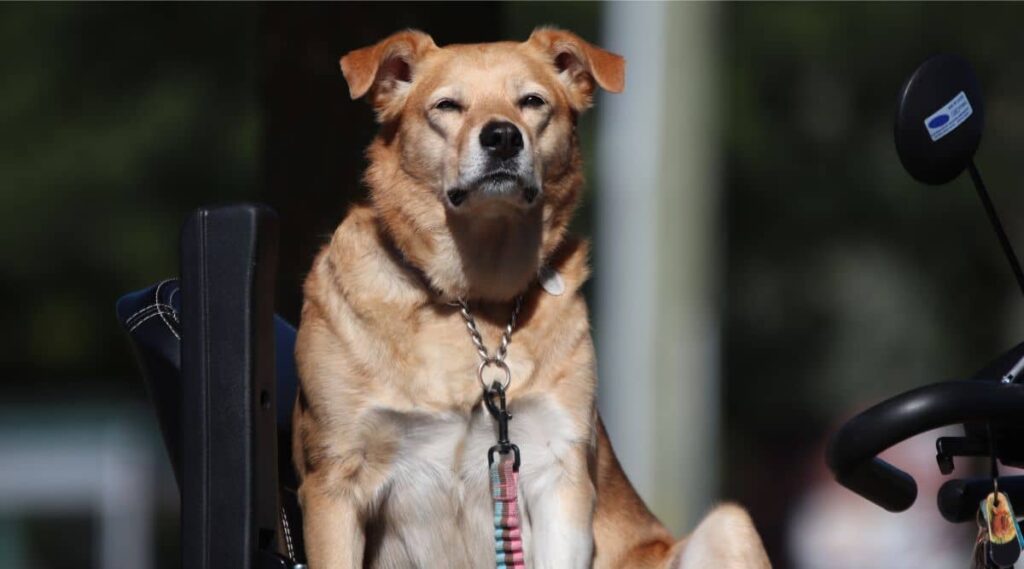
However, they are strong-willed, so they need a strong leader to bring out their best. Start their training early, set boundaries, and stick to them. Rewarding their good behavior is the key to success with this sensitive breed. Harsh or negative training techniques cause distrust between the owner and Chinook.
Unlike most other sledding breeds, with recall training, the Chinook is reliable off-leash. It’s also important to socialize your puppy and introduce them to other dogs, animals, humans, and new experiences. This increases their confidence and creates a well-mannered pup. Regular trips to a dog park are a great way to do this.
Although the Chinook is a pack dog and craves company, crate training your Chinook is beneficial. It provides them with their own space if they need time to themselves. Plus, you can contain them for short periods when you need to leave them at home. You need a large, strong, durable crate that can stand against their digging tendencies.
Health
Chinooks are relatively healthy dogs with an expected lifespan of 12 to 15 years. Like other breeds, they are predisposed to several health conditions that owners need to be aware of.
Cryptorchidism
Cryptorchidism is where one or both testicles fail to descend into the scrotum. Diagnosis is given if the testes fail to drop by four months. The retained testicle(s) are usually removed as it can lead to extreme pain and require emergency surgery later down the line. It also increases the chance of testicular cancer by ten times if they are left. Cryptorchid dogs should never be bred.
Eye Conditions
Like many other breeds, Chinooks are susceptible to several eye concerns, so all breeding dogs should undergo an ophthalmologist examination with the Canine Eye Registry Foundation (CERF). One of the most common eye conditions found in the breed is cataracts. Look for symptoms, including a white spot on the pupil and bumping into objects.
Gastrointestinal Disorders
Some Chinook’s experience chronic gastrointestinal disorders, such as vomiting, diarrhea, and constipation. Many have sensitive stomachs, but this is usually alleviated with a diet designed for this need.
Hip Dysplasia
Hip dysplasia is another common condition in larger dog breeds. It occurs during the developmental stage, where the hip joint fails to form correctly. This results in a loose joint which causes increased wear and tear over time, leading to mobility issues and arthritis. Breeders should screen their dog’s hips, so be sure to ask for their hip certificate.
Seizures
There is a higher occurrence of “seizures” in the Chinook breed than in others. Unfortunately, little is known about it, and research shows that these are episodic movement disorders rather than classic seizures. Dogs are normal between episodes, but Chinooks who have had seizures should not breed.
Nutrition
Feeding your Chinook the best nutrition for your budget is best. The better the quality you provide them, the more satisfied and healthy they feel. How much you feed your Chinook depends on their size, age, activity levels, and the food you pick, so be sure to follow the packaging instructions. This breed is renowned for putting on weight. So it’s essential to keep them healthy and trim, not overdoing it on snacks.
It is also important to remember that many Chinooks suffer from gastrointestinal problems. So you might have to try different foods before you find one that your Chinook does well on. Using a subscription service like Spot & Tango, which is great for dogs with sensitive bellies, means you can tailor the food to their dietary needs. Whatever food you pick, ensure it is appropriate for their age (puppy, adult, or senior).
Grooming
Like the Husky, Chinooks have a thick double coat that sheds throughout the year and is much heavier during the shedding seasons. Shedding seasons usually occur when the weather changes, such as fall into winter and spring into summer. A slicker or a pin brush is a great grooming tool for their thick coat. Brush them daily to keep their skin healthy and to manage their shedding. If anyone in your household has allergies, this pooch is not a great choice.
Chinooks rarely need bathing, and many owners only bathe them once or twice a year. When you do, make sure you rinse the shampoo and dry them thoroughly to avoid sore spots and mold in their coat. They also need their teeth cleaned at least once a week. According to the Chinook Owners Association (COA), their most important grooming requirement is trimming their fast-growing and thick nails.
Breeders & Puppy Costs
Chinooks are rare dogs, and only a limited number of puppies are born in the U.S. yearly. There is also likely to be a waiting list for all puppies. So if you want a Chinook puppy, you need to find a breeder you want to work with and get your name on their waiting list. Because of this, it is also likely that the breeder will choose the puppy that goes home with you based on suitability. Rather than picking the puppy from a litter like you would with more common breeds. Waiting lists can be up to two years.
Research breeders online and look at their credentials. Having their own website, showable experience, and willingness to meet you in person are clear signs of a good quality breeder. They will want to meet you if they think you are a good fit for one of their puppies. Here you can ask them questions, request health certificates, and meet the puppies. The COA lists Chinook breeders throughout the country.
There is little information about how much Chinook puppies cost, as breeders usually keep this information private until they approve potential owners. Research online suggests the average puppy price ranges from $800 to $1,200. On top of the initial puppy price, you need to kit your home with everything your puppy needs and remember the ongoing costs involved, such as food and insurance.
Rescues & Shelters
As Chinook dogs are rare, they are unlikely to be in rescue centers. Most breeders stipulate in the puppy contract that their dogs should be returned to them if the owner cannot look after them anymore. Here at LoveYourDog, we encourage adopting dogs rather than shopping, but in this case, you are extremely unlikely to rescue a Chinook.
As Family Pets
- Chinooks are calm and mellow family pets.
- They are very active and need one hour of vigorous daily exercise.
- Their thick coat needs daily grooming.
- Chinooks are sweet and sensitive.
- They have a soft spot for children and make great family companions.
- They make great exercise partners.
- Watch out for their weight as they pile on the pounds quickly.
- Chinooks are intelligent but need a strong leader to train them well.
- They are vocal but rarely bark.
- Chinooks love the company of humans and other dogs.
Final Thoughts
Chinooks are a rare American dog breed, but it is difficult to understand why once you know the breed. They are large and loveable, children-focused, sweet, caring, fun, playful, and much more. They are adaptable dogs with only a few asks, and that is an active family who can keep them company for most of the day. You might have to wait a while to bring a Chinook puppy home since they are a rare find, but a pup like this is worth the wait!
